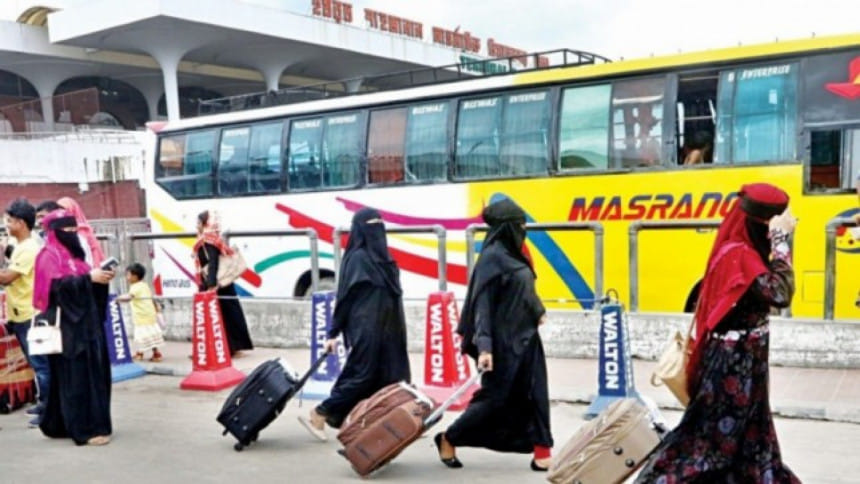Faulty process, false promises

With a two-year job "contract" and dreams of a better life, Akhi Begum (not her real name) left for Saudi Arabia in mid-2019.
But the 27-year-old returned home in Munshiganj within three months, as the work conditions were nothing like what she had been promised.
An excessive workload for a 10-member family, along with a lack of livelihood support such as food and clothes, made the domestic worker soon flee her employer's house in Riyadh.
Saudi police later nabbed and imprisoned her for more than two weeks on charges of absconding before she was given an "out-pass" by the Bangladesh mission for deportation.
"I fled the [employer's] house because I could not bear it anymore," said the mother of three.
Akhi's tale is similar to the accounts of a number of female migrant workers who returned in recent years from Saudi Arabia and other Middle Eastern countries. They left Bangladesh to turn their lives around but came back home empty-handed and at times, having suffered horrid experiences.
'FAULTY' RECRUITMENT PROCESS
Around 151 Bangladeshi female migrant workers, or around 58 percent of those surveyed, returned home within one year of their migration to Middle Eastern countries after facing various challenges, including exploitative work conditions, according to a study report of Ovibashi Karmi Unnayan Programme (Okup).
They returned before ending their two-year job "contracts".
Another 56 female migrants returned between one and two years of migration, 32 between two and three years, and 23 returned more than three years after first migration, stated the report titled "Access to Justice for Bangladeshi Migrant Workers: Opportunities and Challenges", published in March.
Okup, a grassroots migrant rights organisation, conducted a survey of 262 female returnees in Faridpur, Narsingdi, Munshiganj, and Narayanganj who had migrated between 2010 and 2019. The majority of the workers returned between 2018 and 2019.
Non-payment of wages, illness, physical torture, sexual abuse, and excessive work were among the reasons behind their return, the survey found.
The key reason behind 151 women's untimely return within a year of their migration was the "faulty" process under which they were sent, said Okup Chairperson Shakirul Islam.
Some of the workers were provided with false job information, some were falsely assured of higher payment than they were given, while others were sent without proper training, Shakirul told The Daily Star last month.
Over half of these 151 women, 81, returned in less than three months of migration, 31 within three to six months, and 39 within six to 12 months, Shakirul said.
The report found nearly 95 percent of the female returnees were recruited via local sub-agents and three percent directly by recruiting agents, with the remaining two percent migrating via their family members.
EXPLOITATION AT HOME AND ABROAD
According to the report, 88 percent of the female returnees said they were not provided with a formal job contract and were only told about the employer, job responsibilities, wages and benefits through informal discussions.
Almost 45 percent of returning female migrants said they did not receive the amount of wages and benefits that they had been promised by the agents or sub-agents.
Although the recruitment of female domestic workers to any country is supposedly free of cost as per government rules, 65 percent of the women surveyed mostly paid between Tk 5,000 and Tk 1 lakh to migrate. Two percent paid more than Tk 1 lakh.
Nearly 43 percent of the returnees said the agents and sub-agents had "intentionally abused their lack of knowledge about the migration process" and provided "disinformation" about wages, the employers' family, and the amount of work.
Sixty percent, or 156 returnees, reported they often faced physical torture; around 16 percent of all surveyed reported they were sexually abused and exploited.
Just over half the returnees, 133 women, said they had to work around 14 to 18 hours a day, and around 36 percent of returnees had wages of at least one month due when they left their workplace.
Besides, nearly 18 percent of the women were sent abroad using fake medical certificates despite being screened as "unfit" in the first medical test, the report added.
RECRUITMENT MALPRACTICE GOES UNPUNISHED
Okup followed the arbitration cases of 123 female returnees who filed complaints with the Bureau of Manpower, Employment and Training (BMET) in 2019. These were mostly to recover unpaid wages and compensation for forced labour, torture and abuse, and medical treatment costs.
Only around 31 percent of the complaints were resolved by December 2019, with the remaining unresolved as of the time Okup's research was completed.
Penalties against unethical recruitment practices should be brought to the fore while ensuring justice for migrant workers, said Okup's Shakirul recently.
Issues such as the extent to which unethical recruitment practices are responsible for a migrant worker's return after exploitation should be discussed whenever access to justice is discussed or analysed, he said.
"Our research says such malpractice is responsible [for untimely return]. So, they must take the responsibility," he added.
Shakirul suggested establishing a neutral arbitral tribunal to deal with such cases, arguing the existing BMET arbitration could create a "conflict of interest" since BMET is involved in the recruitment process.
Contacted recently, Shamsul Alam, director general of BMET, said they regularly take action against recruiting agencies upon finding them guilty.
Recruiting agencies are summoned if complaints are filed against them, the DG told The Daily Star.
If they are found noncompliant with a job contract, then they have to pay compensation. Besides, recommendations are issued to suspend the license of guilty agents, he added.

 For all latest news, follow The Daily Star's Google News channel.
For all latest news, follow The Daily Star's Google News channel. 




Comments